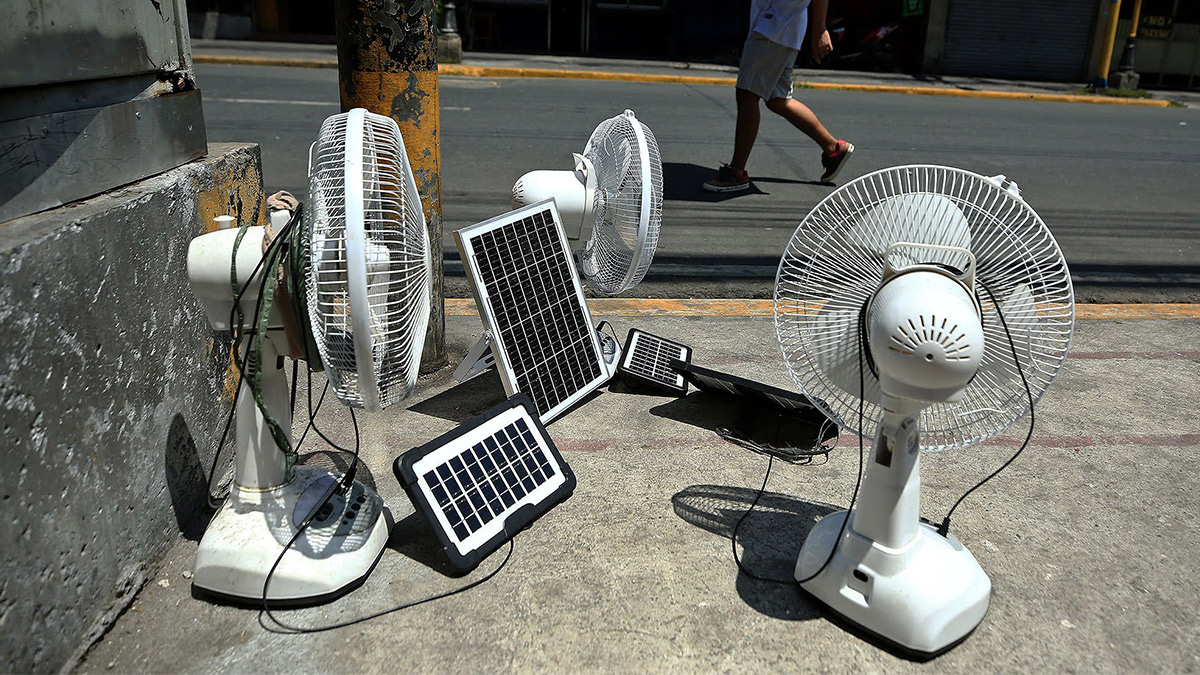
CHARGING TIME Fans powered by batteries charged by solar panels are placed outside a house in San Andres, Manila as the Philippine Atmospheric, Geophysical and Astronomical Services Administration warns the heat index may rise to extreme danger levels in the coming days in some parts of the country. (Photo by RICHARD A. REYES | Philippine Daily Inquirer)
MANILA, Philippines — Around 200,000 customers of the Manila Electric Co. (Meralco) in parts of Metro Manila and nearby provinces experienced a brief power outage on Tuesday after 20 power plants went offline or operated at reduced capacities.
In a statement, Meralco said that automatic load dropping or power interruption due to abnormal grid conditions affected residents in parts of the National Capital Region (NCR) and Pampanga, Bulacan, Laguna and Quezon provinces from 3:30 p.m. to 3:50 p.m.
This occurred as the National Grid Corp. of the Philippines (NGCP) raised red and yellow alerts lasting several hours on Tuesday as nearly 40 power plants in Luzon and Visayas went offline.
READ: Still not enough power for Luzon, says NGCP
The NGCP, in its advisory, raised a red alert status in the Luzon grid from 3 p.m. to 4 p.m. and from 6 p.m. to 10 p.m.
In between these hours, the grid operator placed the whole of Luzon under yellow alert from 4 p.m. to 6 p.m. and from 10 p.m. to midnight. In the Visayas grid, the grid operator issued a yellow alert from 1 p.m. to 8 p.m.
A red alert is raised when the power supply is insufficient to meet consumer demand and the transmission grid’s regulatory requirements. It can lead to power interruptions.
A yellow alert, on the other hand, means the operating margin is not enough to meet the transmission grid’s contingency requirement, although it may not cause power interruptions.
The NGCP said the country’s largest island lost 1,518.9 megawatts of electricity after 18 power plants went on forced outage while two others reduced output.
It added that available capacity in Luzon was 12,832 MW, while demand was estimated to peak at 12,671 MW.
Likewise, a total of 604.4 MW of electricity became unavailable to the Visayas grid, with 20 power plants on forced outage and nine others running on derated capacities.
The available capacity in the Visayas was 2,742 MW as opposed to the peak demand of 2,571 MW.
Meralco said it had asked commercial and industrial customers to temporarily disconnect from the power grid under the interruptible load program (ILP) program to help lessen demand.
Firms’ cooperation sought
“If necessary, we are ready to implement manual load dropping or rotating power interruptions as part of our responsibility to manage the system,” it added.
Meralco and the Department of Energy (DOE) have called on more companies to participate in the ILP to help ensure power supply sufficiency during the dry season.
The ILP is a voluntary, demand-side management program of the Energy Regulatory Commission wherein big customers are requested to use their own generator sets instead of relying on electricity from the grid.
Participants are also compensated for any price difference should they use their own generators.
“We call for your support and cooperation for the country’s objective of having continuous power supply by participating in the ILP and being part of the solution to the power supply challenges,” Irma Exconde, director of the DOE’s Electric Power Industry Management Bureau, said.